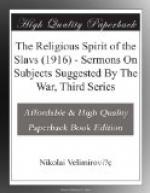So—Christianity is a via media between limitless Polytheism and absolute Monotheism. Professor Haeckel of Jena, in his hatred of Christianity, instanced Mohammedanism as a better religion and scornfully called the Christian religion “Polytheism.” The definition is not altogether untrue. Paganism was not wholly false. The Christian dogma of the Trinity in relation to this world symbolically means unity in multitude. This dogma expresses a principle, an idea, rather than a number. As we cannot define God’s being chemically, historically, psychologically, etc., how can we hope to define Him mathematically? God is beyond numbers; He is beyond scientific research; beyond all expression. One in three, that is half-way to Polytheism and to Monotheism. One in three gives the substance of God’s life and binds Him to His own work, the created world.
God’s own life is dramatic internally, and externally (in relation to the world). That is the real meaning of the dogma of the Trinity. God is somehow one, and yet not one; rather He is a pluralistic unity. He can take part in the human drama and still remain the God of the Universe. He can suffer and still remain perfect. He can be omnipresent in the world and still not be wholly immersed in it. “I cannot understand it; it is a mystery to me,” exclaimed Tolstoi. Certainly he could not understand it; who could? We cannot understand our own beings. Modern biology discovered that a human body consists of millions and millions of corpuscles, minute organic cells which live their life and go their way unconscious of the human person formed by themselves. New discoveries may open up new problems, but the ancient mysteries about everything in the world continue to be omnipresent. How could we have more knowledge about God except some few glances, some imperfect allusions, some symbolical combinations?
However, lacking a clear and perfect understanding, we still feel that we are not alone in the world. God is all round us like the atmosphere that we breathe. The more we try to escape from this atmosphere, the closer it seems to pervade us. Tolstoi felt this as strongly as the most orthodox Fathers of the Church. Yet his doctrines on God, vague and pantheistic as they are, slow to ascribe to God any traditional qualities and trying in vain to invent new ones—his doctrines on God are less comprehensible than the dogma of the Trinity—less comprehensible, less applicable, and unfruitful.
GOD ONLY IS GREAT
Not Napoleon, but God; not London, but God. Tolstoi analysed Napoleon’s life and character, and found that he was no better or greater than thousands of other men who followed him. Why should London be called great? Yes, perhaps it can be called great compared with anything on earth, except God. I say, except God, because after a thousand years, i.e., after one God’s day, God will be surely the same, and London? Will it be in existence a thousand years hence? Who knows? Walking in the streets of London I look round me and see nothing great except God.




